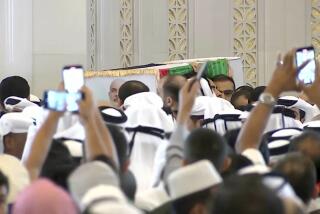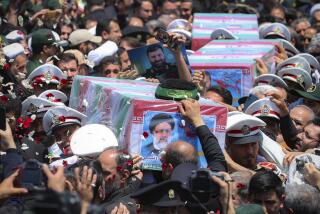HUSSEIN EXECUTED -- AND IRAQ BRACES
BAGHDAD — A defiant Saddam Hussein was hanged at dawn today in a secret concrete death chamber here as the Muslim call to prayer echoed over the capital.
Hussein and 14 Iraqi government representatives were flown by helicopter to the site, according to Iraqi High Tribunal Judge Munir Haddad. Guards escorted Hussein into the room, where he denounced the West and Iran.
Hussein then climbed the high ladder to the gallows.
As his executioners placed a noose around his neck, Hussein blanched but betrayed no emotion, Haddad said.
Hussein refused to wear a hood.
The charged silence that settled over the execution chamber was broken by an exchange between Hussein and four guards, who were apparently followers of Muqtada Sadr, the militant Shiite cleric whose father was killed by Hussein.
“Muqtada Sadr!” they cried out.
Hussein scoffed in reply.
His last word was a sarcastic “Muqtada,” Haddad said. “And then he was hanged.”
No cleric was provided. But as Hussein’s life ebbed away, Haddad said, some of those present uttered a Muslim prayer often used by Shiite congregations to express gratitude: “May Allah bless Muhammad and his descendants.”
The deposed Iraqi president had been convicted of crimes against humanity Nov. 5 for the killings of 148 men and boys from the town of Dujayl after a 1982 assassination attempt -- a comparative handful among the tens of thousands of Iraqi deaths for which he was responsible during his nearly four-decade rule.
His execution officially ends a bloody chapter in this nation’s history but is not expected to quell the sectarian civil war and violent insurgency that have racked the country since his overthrow by an American-led invasion in 2003.
As news of the execution spread, some Iraqis here celebrated with the customary gunfire into the air, and television channels broadcast Hussein retrospectives complete with film of his many victims.
The hanging was photographed and videotaped, in part to provide proof in this rumor-driven society that the former dictator was truly dead, Iraqi TV also reported. But such documentation was not immediately made public.
The deposed Iraqi president’s death warrant was signed Friday by the nation’s two vice presidents, and execution witnesses gathered in Baghdad’s heavily fortified Green Zone, according to an Iraqi official with knowledge of the proceedings. The hanging took place in an intelligence facility in northwest Baghdad.
U.S. officials said Iraqi Prime Minister Nouri Maliki met with Cabinet officials and other politicians throughout Friday to plan the execution. Security was Iraqi leaders’ main concern. Most officials expect Hussein’s death to be followed by a rash of insurgent attacks as former Baathists retaliate against the Shiite-led government.
The government also sorted through execution procedural requirements Friday, including the timing of the execution and the assembly of the gallows.
U.S. military officials handed Hussein over to Iraqi officials around 8 p.m. Friday Baghdad time, according to one of Hussein’s defense attorneys.
Hussein’s execution seemed to be much less than the historic turning point many people in Iraq and the United States once thought it would be.
With Iraq mired in violence, the former dictator’s demise no longer appeared to signal the beginning of new order. Instead, it seemed another reminder of the country’s divisions.
And though Iraq has seen some positive developments, such as national elections, many Americans remain unconvinced that things in Iraq have fundamentally changed for the better.
President Bush said in a written statement that Hussein had been executed after receiving a fair trial, “the kind of justice he denied the victims of his brutal regime.”
“Fair trials were unimaginable under Saddam Hussein’s tyrannical rule. It is a testament to the Iraqi people’s resolve to move forward after decades of oppression that, despite his terrible crimes against his own people, Saddam Hussein received a fair trial,” Bush said in the statement issued in Crawford, Texas, where the president is taking a winter vacation at his ranch.
The execution “will not end the violence in Iraq,” he said, “but it is an important milestone” in Iraq’s effort to become a self-sustaining democracy and U.S. ally in fighting terrorism.
Deputy White House Press Secretary Scott Stanzel said Stephen J. Hadley, Bush’s national security advisor, briefed the president about 6:15 p.m. CST about the imminent execution.
Stanzel said Hadley told the president that Maliki had informed Zalmay Khalilzad, the U.S. ambassador to Iraq, that the execution would take place within several hours. He added that Bush went to bed before the execution, around 9 p.m. CST, and was not awakened after it was carried out.
Maliki legal advisor Mariam Rayis said Hussein’s death warrant was signed by Vice Presidents Tariq Hashimi, a Sunni Arab, and Adel Abdul Mehdi, a Shiite. President Jalal Talabani, a Kurdish death penalty opponent, was out of Baghdad on Friday and delegated his capital authority to Mehdi, Rayis said.
The gallows was set up by midnight Baghdad time, Rayis said, and Hussein was led to the scaffold dressed in normal clothes.
Defense lawyer Najib Nuaimi said U.S. military officials asked him Friday morning to send someone to pick up Hussein’s personal effects, such as clothing, books -- including a Koran -- and a manuscript Hussein had been writing.
“He was writing his biography,” Nuaimi said. “But I don’t think he had a chance to complete it.”
Among the witnesses at Hussein’s hanging were a representative from the Interior Ministry, Iraqi High Tribunal Judge Munir Haddad, chief prosecutor Munqith Faroon, a physician, and a cleric who read from the Koran, Rayis said. Mowaffak Rubaie, Iraq’s national security advisor, also attended.
Survivors from Dujayl did not attend, Rayis said.
Ali Hassan Mohammed Haidari, the first witness to take the stand against Hussein in the Dujayl case, wanted to see the execution but decided he didn’t want to risk the dangerous drive to Baghdad, 60 miles away.
He said the execution made his family “very happy” but would not quell suffering. “You can imagine a mother who has lost seven children cannot avoid shedding tears even in the midst of this happy moment,” he said.
Other Dujayl victims said their relief over Hussein’s death was dampened by the fact that they had not witnessed their tormentor’s final moments.
“I have been waiting for the last 40 years for such a moment,” said Dujayl Mayor Mohammed Zubaidi, whose father and brother were killed in jail by Hussein’s regime. “I was always hoping that this execution would take place inside the town of Dujayl because this is where the case happened.”
Hussein’s wife, who is in Qatar, and a daughter in Jordan could not attend the execution because they are both fugitives from Iraqi justice, Rayis said, and Hussein’s lawyers were barred from attending.
Hussein defense attorney Bushra Khalil said that Raghad Ali, Hussein’s eldest daughter, wanted her father to be buried in Yemen “until Iraq is free of the occupiers.”
Hussein’s family is “depressed,” Khalil said.
Khalil said Hussein had told her that he refused sedatives offered by Americans to calm his nerves and he had been resigned to his fate.
“We asked him if he would like us to communicate anything to the leaders of the Arab world,” she continued.
“He said no. His only request would be to Allah.”
Khalil warned that Hussein’s death would have violent consequences for Iraq.
Hussein’s lawyers sought a temporary restraining order Friday at an appellate court in Washington, D.C., to force the U.S. military to retain custody of Hussein. Hours before Hussein’s death, the court refused to intervene.
Hussein’s execution coincided with the end of the hajj, the seasonal Islamic pilgrimage to Mecca. Most Sunnis began Eid al-Adha, the Feast of Sacrifice, after morning prayers today; most Shiites will begin Sunday morning.
Nuaimi said that Maliki, a Shiite, had pushed for Hussein’s execution during the holiday to “make a gift during Eid to his party.”
Hussein “will be the sacrificial lamb for the Shiites, and the Iranians in particular,” said Nuaimi, referring to many Muslims’ practice of slaughtering lambs after pilgrimage for celebratory feasts.
U.S. officials expressed concern that news of the execution’s imminence, which began circulating Thursday, might have given insurgents time to plan attacks. U.S. military officials said they had beefed up security in Baghdad in advance of the execution and to ward off possible retaliatory violence.
Iraqi and U.S. officials said the government would probably extend Friday’s curfew indefinitely.
Hussein’s family wants to bury him in his hometown of Tikrit in northern Iraq but are afraid the government will cremate him and scatter the ashes, Nuaimi said.
Rayis said Hussein’s body was to be wrapped in a white sheet and would be buried by Iraq’s Directorate of Social Welfare if it not claimed by a family member.
His execution ended other legal proceedings against Hussein, including his genocide trial involving the Anfal military campaign. That operation left tens of thousands of Kurds dead by gunfire, bombings and poison gas.
Times staff writers Alexandra Zavis and Saif Hameed in Baghdad, Paul Richter in Washington and James Gerstenzang in Crawford, Texas, contributed to this report.
More to Read
Sign up for Essential California
The most important California stories and recommendations in your inbox every morning.
You may occasionally receive promotional content from the Los Angeles Times.











